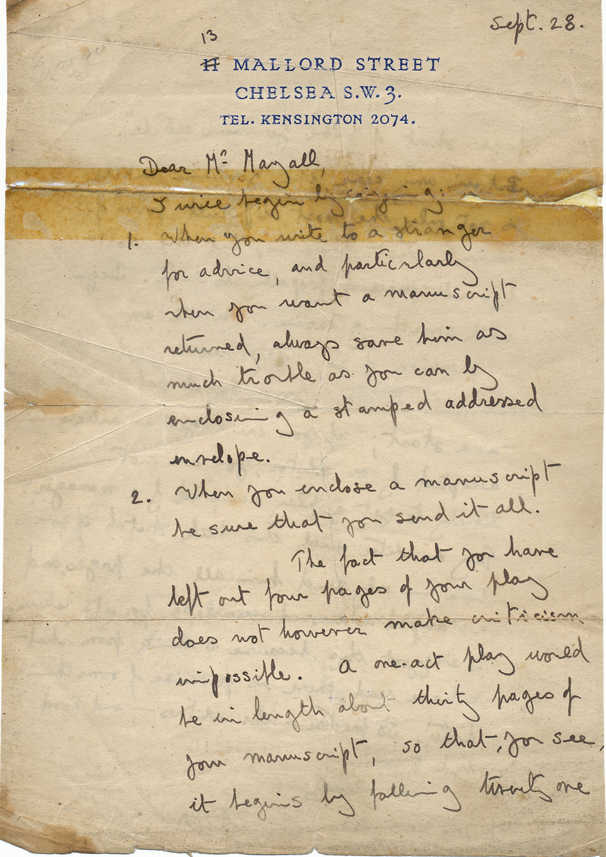A. A. Milne
A. A. Milne
A. A. Milne Autograph Letter Signed
FABULOUS, ORIGINAL HANDWRITTEN LETTER BY A. A. MILNE CIRCA 1925, the creator of Winnie the Pooh and Christopher Robin.
The content of this letter is wonderful, revealing an insight into Milne’s persona not often seen in his correspondence. In reply to a “Mr. Mayall”
regarding a manuscript play submitted to Milne for consideration, the famous author is firm in his criticism of the sender’s submission, while offering him helpful advice for future submissions:
Sept. 28
Dear Mr. Mayall,
I will begin by saying:
1. When you write to a stranger for advice, and particularly when you want a manuscript returned, always save him as much trouble as you can by enclosing a stamped addressed envelope.
2. When you enclose a manuscript be sure that you send it all. The fact that you have left out four pages of your play does not however make criticism impossible. A one-act play would be in length about 30 pages of your manuscript, so that, you see, it begins by falling just short of “the genuine article.”
But in any case, the genuine article is not only the most difficult form of writing that there is, but the most difficult piece of property to sell. Begin with something easier. Write an impression of your day’s work, and send it to one of your local papers as a start; if you can’t get an article accepted by an editor you are not likely to get a play accepted by a manager. Try an editor with this little sketch if you like — only send him all the pages, and a stamped addressed envelope for its return. I suggest this, because I think from what I have read that there is promise of something better. So practice on the editors — and good luck to you.
Yours sincerely
A A MilneAlways write your name and address on a manuscript.
At the time, Milne was an editor for Punch magazine and a successful playwright himself. The letter is penned entirely in the author’s own hand and is signed by him. Two-page letters by Milne are extremely scarce.
This important letter was written from Milne’s home at Mallord Street, Chelsea, where both his son Christopher and his most famous character “Winnie-the-Pooh” were born (11 Mallord Street had been renumbered 13, which Milne corrected on letterhead). Milne’s first book written at Mallord Street was When We Were Very Young (1924), followed by Winnie-the-Pooh (1926), Now We are Six (1927) and The House at Pooh Corner (1928). Milne’s famous character “Christopher Robin” was based upon his son, Christopher Robin Milne. Winnie-the-Pooh, the fictional bear often shortened to Pooh Bear or simply Pooh, is among the most enduring of all fictional characters.
This very rare letter remains in good to fair condition [see images]. Tape repair at fold, some soiling, creased at folds, edge wear, etc. All in all, this desirable two-page letter remains very presentable. Letter occupies two sides of one sheet (i.e. two pages) and sheet measures approx 5.5″ x 7.25″.
Alan Alexander Milne (1882-1956) was an English author, and the creator of the iconic “Winnie the Pooh”, the beloved stuffed bear who starred in a series of his books and much later in the animated films of Walt Disney. Winnie the Pooh has endured as one of the most popular and widely recognized fictional characters in the world. Milne was both an author and playwright who found his greatest success writing tales for children. His 1924 book of poetry When We Were Very Young soon became a classic. The 38th poem in the book, “Teddy Bear”, originally appeared in Punch magazine in 1923, and became the first appearance of the now famous character “Winnie-the-Pooh”. Milne’s book by the same name (Winnie-the-Pooh) was initially published three years later. This seminal children’s text was inspired in part by the stuffed toys of Milne’s son, Christopher Robin, who appears in the stories with Pooh.
All Vintage Memorabilia autographs are unconditionally guaranteed to be genuine. This guarantee applies to refund of the purchase price, and is without time limit to the original purchaser. A written and signed Guarantee to that effect accompanies each item we sell.

